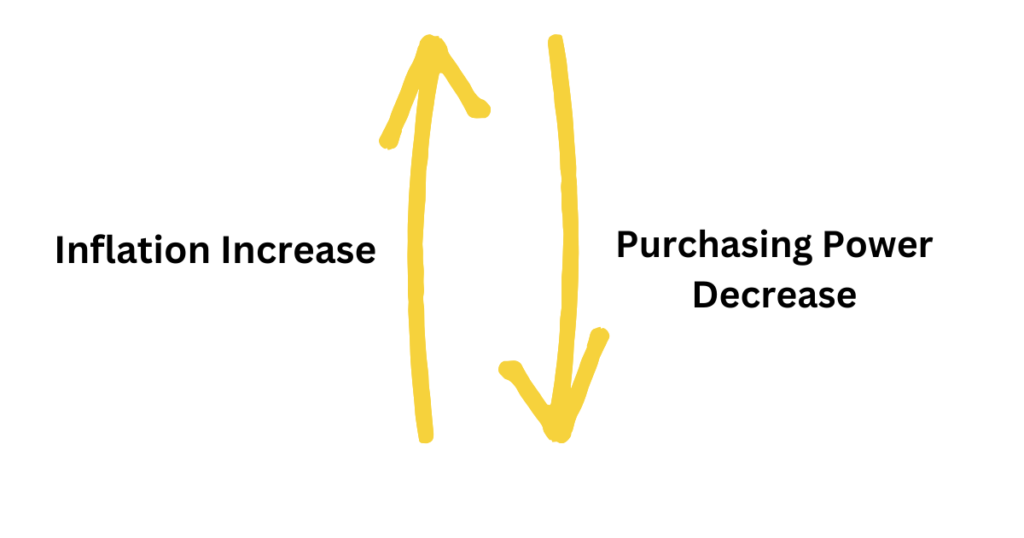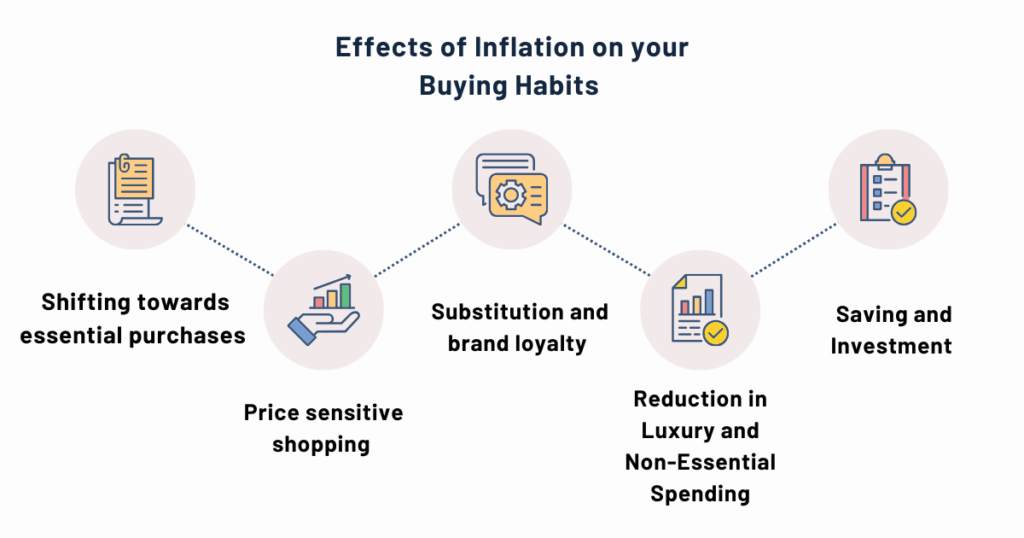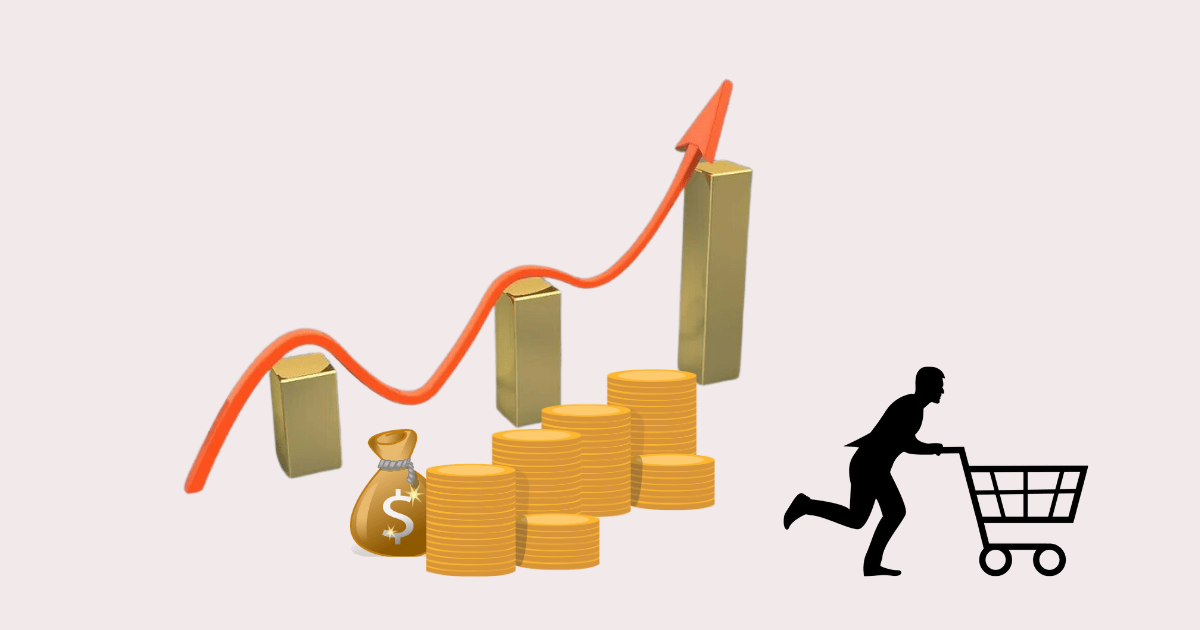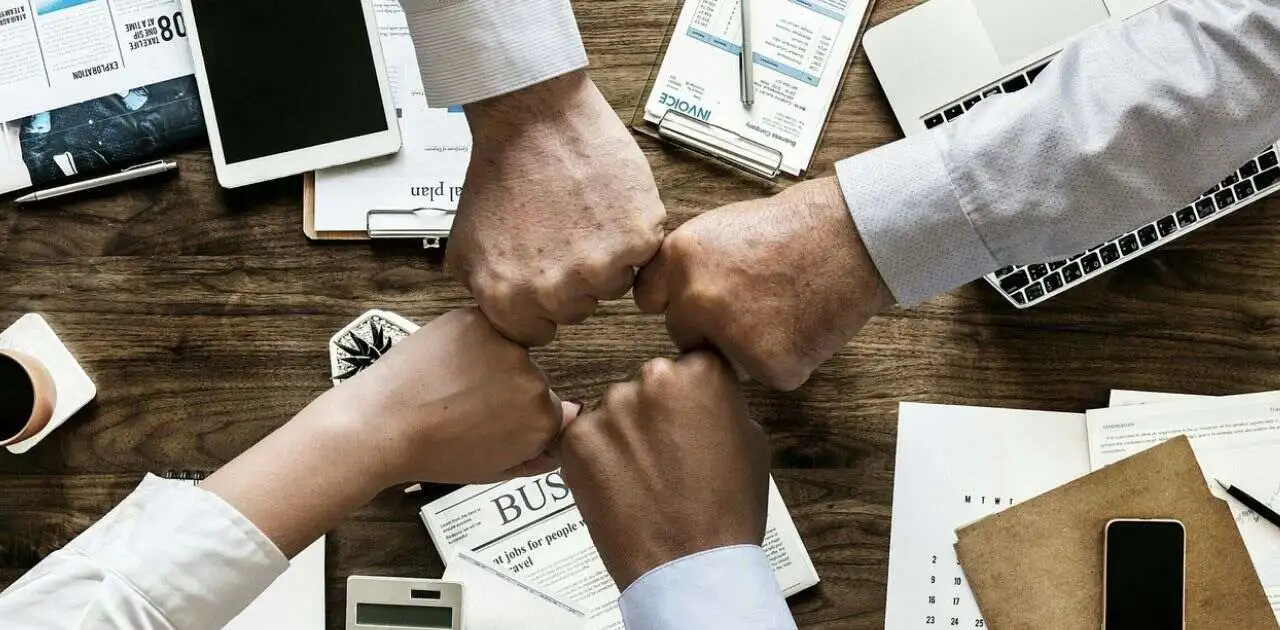A price increase has greatly affected consumer’s purchasing power. Inflation makes you feel a pinch, especially in your buying habits. But do you know how does inflation affect your buying habits?
The inflationary pressure changes your buying habits to essential purchases, price-sensitive shopping, and reducing luxury shopping.
The blog explores inflation’s impact on consumer spending and its effects on your buying habits.
Table of Contents
Understanding Inflation
Inflation refers to an increase in the overall prices of goods and a decrease in a currency’s purchasing power. A decrease in currency’s purchasing power means each currency unit buys fewer services and goods as time passes.
The following are some types of inflation that affect your buying routine.
- Demand-pull Inflation: It refers to an increase in aggregate demand for goods in an economy.
- Cost-push Inflation: The average prices increase when the cost of goods and other services increases.
- Built-In Inflation: This inflation occurs when labor demand for an increase in wages and businesses increase the prices of different goods to cover increased labor costs.
- Monetary policies of Government: Actions of central banks, like the Federal Reserve in the U.S., can influence the prices. When central banks increase the money supply and decrease interest rates, it can stimulate spending and lead to higher inflation.
Relation between Inflation and your Buying Habits
Before discussing how does inflation affect buying habits? It is necessary to pin the relationship between them.

Inflation and purchasing power share an inverse relation. Like with the increase in prices, your purchasing power declines.
For example, a research firm, Numerator, reported that a woman aged 55 to 64 was a typical U.S. Walmart shopper in 2022. Before Inflation:
- She was buying 13 goods once a week for a total price of $60.
- Usually, she would purchase groceries, including fruits, sweets, fast food meals, and chicken.
But after Inflation:
- Her buying habits became adaptive in response, and she spent less.
- She started buying essential goods.
- She shifted towards cheaper purchases.
How Does Inflation Affect Your Buying Habits?
Inflation affects consumer spending by changing their buying habits. Here are some ways in which your buying habits change.

1. Shifting towards Essential Purchases
In the face of high inflation, your buying habits naturally shift towards essential purchases. It’s a challenging situation that prompts you to reevaluate your spending choices and adopt a more cautious approach to your finances.
When inflation affects your buying habits, you concentrate on securing the necessities for yourself and your loved ones. Those essential shopping include goods necessary for your family’s health, like products for personal care, food, and infant supplies.
Reports show that about 48-74% of consumers reduced their spending habits in Bars, restaurants, and apparel. So, as prices increase, your buying habits change to buying essential products.
2. Price Sensitive Shopping
As inflation and purchasing power are inversely related, inflation changes your buying habits to only price-sensitive shopping.
With shifting toward important purchases, your attention also diverts to cheaper products and goods during inflation.
When faced with rising prices, it’s only natural for individuals and families to become more budget-conscious, seeking more affordable alternatives to stretch their hard-earned money.
Data shows that after a price increase in the summer of 2022, 20% of consumers shifted to buying cheaper products and brands.
3. Substitution and Brand Loyalty
Inflation affects consumer spending by shifting you to cheaper alternatives offering similar products. With continued price increases, brand loyalties often take a seat back as consumers seek cost-effective alternatives.
The loyalty to familiar brands, which typically drives purchasing decisions, becomes more flexible as people prioritize value over brand names.
Interestingly, this shift signifies not disloyalty but rather a pragmatic adaptation to economic challenges.
4. Reduction in Luxury and Non-Essential Spending
In the face of high inflation, you reduce luxury and non-essential spending to cope with inflation. Data shows about 80% of consumers expect to change their buying habits from luxury spending to non-luxury products.
As Ayn Rand has quoted “Money is only a tool. It will take you wherever you wish, but it will not replace you as the driver.”
So, amidst inflation, your money can’t take you far and you reduce your purchases.
Due to inflation’s impact on consumer spending, their purchasing behaviors on holidays change:
- Purchase fewer essential products
- Buying more at mass retailers like Walmart and Target
- You prefer to purchase items in bulk or stockpile non-perishable goods with high prices.
- Consumers often turn to online shopping platforms and price comparison websites or apps to find the best deals and discounts.
5. Saving and Investment
Inflation affects your buying habits by changing your saving and investment behaviors. When inflation is high, the real value of money declines over time, making cash savings less attractive as it erodes purchasing power.
As a result, you are often motivated to seek out investment opportunities that can outpace inflation.
But Nathan W. Morris says “Every time you borrow money, you’re robbing your future self.”
Therefore, don’t borrow money and allocate a more significant portion of your savings into assets like stocks, real estate, or commodities, as these tend to have the potential for higher returns and can act as hedges against inflation.
Effects of Inflation on Consumers – Facts and Statistics
Inflation has seriously affected consumers. Around the globe, the inflation rate was 8.75 percent in 2022 compared to 2021, and it became seven percent in 2023 compared to 2022. This inflation wave has significant influences on consumers.
For example, In the United States, all consumers have changed their daily buying habits and are concerned about day-to-day spending habits. A survey conducted in February 2023 reported that all Gen X consumers in the U.S. have felt the same way.
However, this price hike has not affected some consumers. For example, some consumers in the U.S. reported that their purchasing and spending habits had not been affected by inflation.
When inflation affects your buying habits, you must review your spending habits according to your social financial status.
How Does Inflation Erode Purchasing Power?
Inflation erodes purchasing power by reducing the actual value of money. With this, you can buy fewer goods with the same amount of currency. This phenomenon occurs due to some interrelated factors:
- Reduced real value of money: In an inflationary environment, the nominal value of money remains constant, but its real value declines as prices rise. This means that the currency you hold can purchase less than it could in the past.
- Distorted economic decisions: During a price increase, individuals and businesses may make financial decisions based on short-term considerations as they try to avoid holding onto cash that loses value over time. This can result in suboptimal resource allocation and economic inefficiency.
For example, consider the scenario below, which highlights the effects of inflation on your buying habits.
Scenario:
Imagine you’ve been saving money for a long-awaited dream vacation, and you’ve finally reached your savings goal. You’ve been diligently putting away money each month, excited about the adventures that await. However, as you get closer to booking your trip, you notice that flights, accommodations, and dining prices have increased. What was once an affordable trip now seems more expensive than you anticipated.
Adapting Your Buying Habits Amidst Inflation
Because of the various effects of inflation on consumers, you must adapt your buying habits. It is crucial for maintaining financial stability and ensuring you can still meet your needs without overstretching your budget.
Here are some practical strategies for adapting your buying habits:
- Smart Spending: Be a savvy shopper. Look for deals and discounts, opt for store brands, and avoid impulse purchases to avoid the effects of inflation on your buying habits.
- Prioritize Purchases: Focus on needs over wants. Ensure essentials like food, housing, and healthcare are covered before indulging in non-essentials.
- Build an Emergency Funds: Save for unexpected expenses. A financial cushion can help you weather unexpected challenges without debt.
- Purchase Wisely: Make informed choices. Buy in bulk for savings, invest in assets that outpace inflation, and avoid high-interest debts.
- Stay Informed: Keep an eye on economic trends and government policies. Understanding how inflation affects your finances helps you plan effectively.
- Reduce Expense: Trim non-essential spending. Consider lifestyle adjustments, like fewer subscription services or more home-cooked meals.
- Monitor Your Buying habits: Regularly review your purchases to identify cost-saving opportunities and prevent overspending.
- Seek expert advice: Don’t hesitate to consult financial experts for investment, debt management, and long-term financial planning guidance.
You can build these buying habits amidst inflation just like other habits. Remember! The time taken to build habits is different for everyone.
You can also track your buying habits in the notion to cope with the price hike.
Why do Consumers Buy More at Lower Prices?
Consumers buy more at lower prices primarily because they perceive more excellent value. Also, to reduce the effects of inflation on buying habits, they try to get a good deal at lower prices.
Lower prices also create economic incentives, as people can acquire more for the same amount of money, and the fear of missing out often motivates consumers to act swiftly. So, lower prices stimulate consumer demand by offering economic advantages and psychological satisfaction.
Should You Change Your Buying Habits Because of Inflation?
Yes, it’s often a good idea to consider changing your buying habits in response to inflation. Due to the inverse relation between inflation and purchasing power, it gradually erodes the purchasing power of your money, which means that your hard-earned dollars will buy less than they used to.
While not all aspects of your buying habits need to change, being aware of the inflation impacts on consumers and making informed decisions can help you maintain your financial stability. When Inflation affects your buying habits, your decision to change buying habits achieves your financial goals in an evolving economic landscape.
Sometimes, inflation produces some bad habits for mental health. To cope with this, you must change your buying habits amidst inflation.
Final Thoughts
Usually, inflation affects your buying habits. Your buying routine changes with the price hike, and you go for only essential purchases in the market, reduce luxury shopping and invest wisely. Whenever you notice a price hike, you adapt your buying habits. As inflation erodes the purchasing power of money, you think of buying at lower prices, monitor your purchasing and spending habits, and prioritize your expenses. Make excellent and positive buying habits, which will make your life satisfactory.




